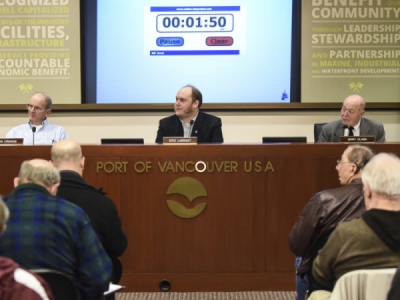
Posted on May 15, 2019
Speakers at meeting urge adoption, but tenants have raised concerns
Climate change activists continue to press the Port of Vancouver to adopt a policy prohibiting it from building fossil fuel terminals.
A dozen people testified during the open forum section of the port commissioners’ Tuesday meeting and advocated for local action to counter global climate change.
“Our children are going to have a horrible life if they have to live indoors, in filtered homes, and never go outside,” Cathryn Chudy said.
During an April 23 workshop, commissioners discussed a draft renewable/clean energy policy that states: “The port shall not pursue new bulk crude oil or coal terminals.” Several people who testified at the start of Tuesday’s meeting said the draft also should bar facilities for liquefied natural gas and liquefied petroleum gas.
“Pick your evil,” Heidi Cody told commissioners. “Both are kissing cousins of coal and not much cleaner. … We need to shift to renewables now and stop clinging to fossil fuels.”
Carrie Parks said she rejects any notion of a trade-off between the economy and the environment.
“As Gov. (Jay) Inslee has been pointing out, Washington has a roaring economy, one of the best in the nation, because we are green,” she said.
The push to stay away from fossil fuel opportunities comes after last year’s rejection of what would have been the largest oil terminal on the West Coast at the port. Opposition to the oil terminal helped carry Commissioner Don Orange to victory in the 2017 election.
Following Tuesday’s comments, Orange said he is talking with port tenants who fear they could be affected by the policy, adding that he wants to avoid “unintended consequences.”
The draft policy pledges the port to “support existing tenants in their current operations” and approach projects, customers and cargoes with a “triple bottom line” methodology that considers social, economic and environmental factors.
Commissioner Eric LaBrant mentioned that North Dakota has threatened to sue Washington after the Legislature approved a bill requiring oil shipped by rail to have more of its volatile gases removed before it can be transported through this state.
About 150,000 barrels of highly flammable Bakken crude oil are transported daily by rail to Washington refineries. North Dakota’s Industrial Commission, which is comprised of the state’s governor, attorney general and agriculture commissioner, intends to sue Washington if Inslee signs the legislation, on grounds that it violates interstate commerce law.
LaBrant said commissioners need to protect the port from liability and avoid “needless exposure.”
Commissioner Jerry Oliver said the Port of Vancouver has received letters expressing concerns about the draft renewable/clean energy policy from ports in Clarkston and Pasco, as well as in Lewiston, Idaho, and Boardman, Ore.
“Some of them, shall I say, were modest,” Oliver said. “And some of them had sharp points.”
Following Tuesday’s meeting, Oliver said he expects commissioners will return to the draft renewable/clean energy policy, but he isn’t sure what “form that action might take.”
LaBrant said he expects action in the next two months.
“My hope is we will be discussing that at either the May or June meeting,” he said. “I want to move forward on it, but I want to do so in a way that protects the port’s interests.”
The port commissioners’ next meeting is at 8:30 a.m. May 28 in the port’s office, 3103 N.W. Lower River Road, Vancouver.
Source: columbian.com





